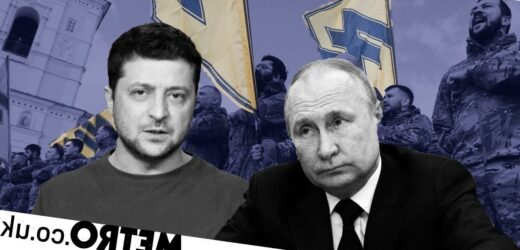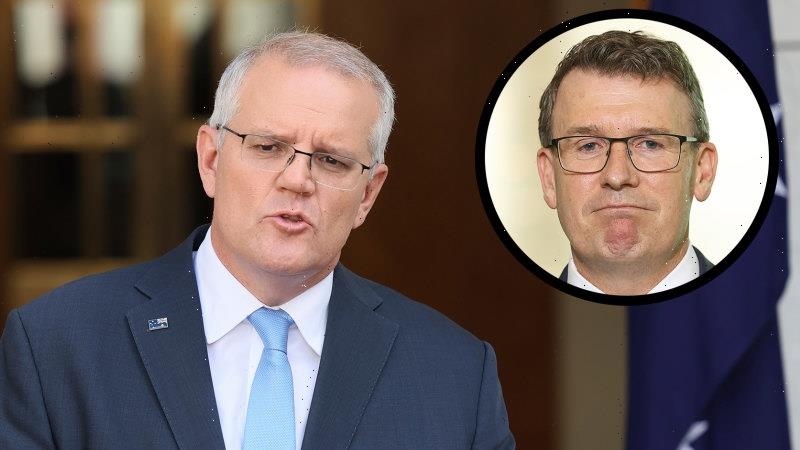As Russia bombards Ukraine with tank fire and missile strikes, it is also waging an information war against its neighbour.
And while it could be tempting to assume all of the propaganda is coming from the Kremlin, some questionable statements have also been coming out of Kyiv.
Separating the truth from the fiction can be pretty tiring, and perhaps this could work in Vladimir Putin’s favour as he seeks to justify his invasion.
One of the key reasons he gives for sending his troops across the border is that they are there to ‘denazify’ Ukraine and save its Russian speaking population from ‘genocide’.
The irony that this mission is being waged against President Volodymyr Zelensky – a centrist politician of Jewish descent who lost relatives in the Holocaust – won’t be lost on many.
Even more ironic is that Putin’s regime is now facing accusations of genocide, as dead bodies of civilians pile up in regions surrounding Kyiv – with evidence of people being raped and tortured.
It’s true to say that Ukraine has its share of extremist far-right groups, and political analysts say it does no good to idealise Ukrainian society by ignoring them.
But at the same time, they say Putin is exaggerating and distorting the issue – playing on a deeply ingrained collective memory of the Soviet Union’s fight against the Nazis during World War II.
At the start of the invasion, Russia’s leader said Kyiv had been taken over by a ‘gang of drug addicts and neo-Nazis’ – but the country’s election results suggest otherwise.
‘When you look at the election results from 2019 the coalition of nationalist right-wing parties got 2.15%. This is really marginal and they don’t have any larger support in the population,’ Professor of European and Jewish History and Culture Katrin Steffen tells Metro.co.uk.
This was below the 5% electoral threshold, meaning none of these ultranationalist parties secured parliamentary seats.
In comparison, Marine Le Pen’s National Front party (now National Rally) secured 33.9% of the popular vote in France’s 2017 presidential elections.
And she is the closest she’s ever been to beating Emmanuel Macron as French voters go to the polls today.
‘Far-right groups do retain a presence but there are other countries in Europe who don’t do much better,’ adds Professor Steffen, from The Sussex Weidenfeld Institute of Jewish Studies.
‘There is a potential for the far-right in Germany in eastern parts, we have it in France for sure – I would not say that Ukraine is standing out here.
‘When President Zelensky was elected President in the 2019 campaign, it was known that he is of Jewish descent and it just was not a topic. It was not talked about. There was no anti-Semitic propaganda whatsoever.’
Despite far-right parties remaining on the fringe of Ukraine’s politics, Russia’s media and government has been labelling the country a ‘fascist state’ for some time now.
The claim was used to justify the annexation of Crimea in 2014, with Moscow branding the Maidan Revolution that same year a ‘fascist coup’ – as pro-Russian president Viktor Yanukovych was ousted.
After this change of power and the Russian aggression that followed, far-right nationalist groups enjoyed a rise in popularity within Ukraine.
They still weren’t close to any real political power, but that hasn’t stopped ultranationalists from attacking LGBT groups, left wing activists, and Roma in the streets – all of which has played into the hands of Russia’s propagandists.
Shocking images of a giant swastika depicted on an LED staircase of a Kyiv shopping mall in 2019 is what Ukraine described as a ‘hybrid information warfare’ waged by pro-Kremlin hackers.
Another gift to Putin’s propaganda machine is the Avoz Battalion, the far-right militia group behind some of the fiercest fighting against pro-Russian separatists in the east from 2014.
Its founder Andriy Biletsky, is an avowed white supremacist who in 2010 said Ukraine’s mission was to ‘lead the white races of the world in a final crusade … against Semite-led Untermenschen [subhumans]’.
The group’s logo uses a variation of the Wolfsangel symbol adopted by German Nazis, and the Black Sun symbol used by many white supremacist groups.
In the summer of 2014, Azov Battalion volunteers managed to recapture of Mariupol from pro-Russian separatists.
Then-President Petro Porshenko – a centre-right politician – praised them as ‘our best warriors’ and ‘our best volunteers’ at an awards ceremony in 2014.
The unit – whose fighters are highly trained and have a fearsome reputation – was officially integrated into the national guard in November that year.
Many say this was done out of practicality rather than ideology, as Ukraine sought to bolster its defences against its hostile neighbour by bringing Azov fighters under its control.
However, it could also have something to do with the group’s close ties with Arsen Avakov, Ukraine’s interior minister who served under several governments and resigned under Zelensky last year.
In November 2014, Ukraine’s chief rabbi Yaakov Bleich condemned Avakov’s decision to appoint the Battalion’s deputy commander Vadym Troyan as police chief.
He said: ‘If the interior minister continues to appoint people of questionable repute and ideologies tainted with fascism and right-wing extremism, the interior minister should be replaced.’
Since 2014 the battalion has tried to distance itself from its political roots, with Biletsky leaving his post and going on to lead the National Corps party.
It is thought some fighters are now joining because of its reputation on the battlefield rather than political reasons, but the regiment is still has many Nazis in its ranks.
The unit was clearly enough of a concern for Washington’s Congress to pass a ban on any aid going to the Azov Battalion in 2018.
Despite its sleek PR and reputation among the international far-right, the Azov Battalion has about 1,000 fighters, compared to 250,000 in Ukraine’s armed forces.
They are not representative of all the people enlisting to defend their country, and the idea that Russians have been sent to ‘fight Nazis’ simply isn’t true – but for many the idea persists.
Ukraine’s modern history, which saw people collaborating with Nazi Germany to resist the Soviets, has also played in to this stereotyping of the country.
Militant Stepan Bandera is hailed as a hero for Ukrainian independence by many and by others, a monster behind atrocities against Jews, Poles and Russians.
Streets in Ukraine are named after him, and many people have mythologised him while ignoring some of the less favourable details of his legacy.
Professor Steffen says Ukraine must address the the ‘darker chapters of its history’, but that Putin is ‘abusing’ this for personal gain. She says: ‘This is a very painful and complicated history, but people have started to work on this.
‘This all is not a justification for anything like Russia’s aggression right now. You could say Ukraine was an anti-Semitic country in 1919 when really a lot of Jews were killed.
‘When you look at what the Jewish community say today in Ukraine they say there has really been a change.
‘It is a total distortion of Ukrainian reality when Putin speaks of denazification or alleged genocide against his people in eastern Ukraine,’ she adds.
Professor Steffen says Putin knows that many Russians, particularly in older generations, are going to take this message on board.
‘The fascists for Putin are every state that is against Russia or is against Russian memory of World War II,’ she adds.
‘He has somehow elevated the memory of the Soviet victory to the status of a national religion. He is the great leader of this victorious nation.’
As political strategist Yuri Vanetik puts it, the word Nazi ‘immediate creates an archetype’ that the Russian public can easily identify with.
‘Nazis torture people, they’re evil, they have to introduce that element. We’re battling evil, and we’re also doing things to keep Russia safe.
‘Russia is not just Moscow and St Petersburg, there’re a lot of people who just watch TV, they don’t know what a VPN is, they don’t use their smartphone’s capabilities,’ he adds.
‘If we just have a platform that says “Nazis” a lot of people are going to believe that Russia is fighting Nazis and liberating Ukrainians.
This idea takes a disturbing form in a recent propaganda piece published by Russian state news agency RIA Novosti.
Titled ‘What Should Russia do with Ukraine?’, the article calls for ‘liquidation’ of Ukrainians opposed to the invasion and says troops should not draw a distinction between military personnel and civilians.
It says: ‘Denazification is necessary when a significant part of the people – most likely the majority – has been absorbed and drawn into politics by the Nazi regime.
The piece, written by Timofei Sergeitsev, adds: ‘A significant part of the population, which are passive Nazis, accomplices of Nazism, are also guilty.
‘War criminals and active Nazis must be punished appropriately and demonstratively. Total purification should be carried out.’
The ‘fighting Nazis’ myth is a pretext used for Russia to seize large chinks of Ukraine and ‘restore its empire’, says Dr Leon Hartwell, Sotirov Fellow at LSE’s IDEAS think tank.
‘For Putin the idea of this power he was working for, the Soviet Union, collapsing, was complete humiliation, so he’s always wanted to restore Russia’s past glory.’
In a 2005 speech in which he called the USSR’s collapse ‘a major geopolitical disaster of the century,’ he said: ‘Tens of millions of our co-citizens and co-patriots found themselves outside Russian territory. Moreover, the epidemic of disintegration infected Russia itself.’
Many saw Putin’s televised address to Russia in the days before his invasion as another sign of his imperial ambitions. He said: ‘Ukraine is not a neighbouring country, is an integral part of our history and culture.’
Another claim of Putin’s Dr Hartwell wants to dispel is that all ethnic Russians living in Ukraine are on the same page and want to be ‘liberated’ by Moscow.
Ukraine has set up a dedicated battalion for Russians who want to fight Putin’s forces.
Dr Hartwell says many of those who gathered in 2014 for the Maidan protests, who wanted Ukraine to be more closely aligned with the EU, were also ethnic Russians.
He adds: ‘They saw their future in the EU and Putin did not want that for his neighbour, so that’s when he started to destabilise the situation in Ukraine.’
Get in touch with our news team by emailing us at [email protected].
For more stories like this, check our news page.
Source: Read Full Article




